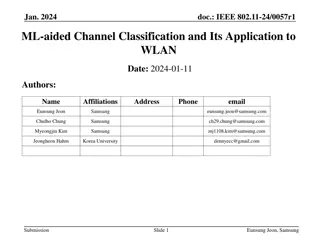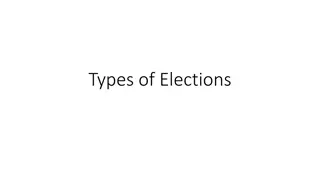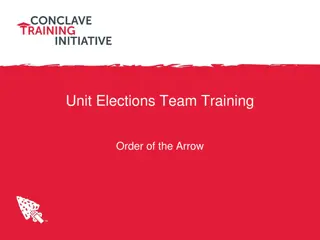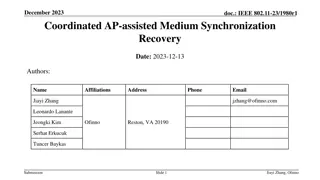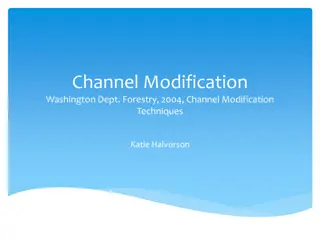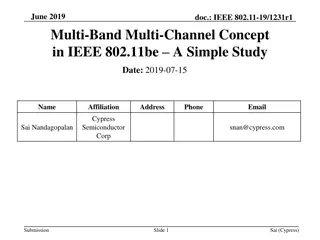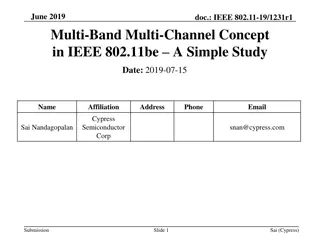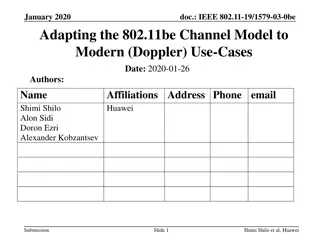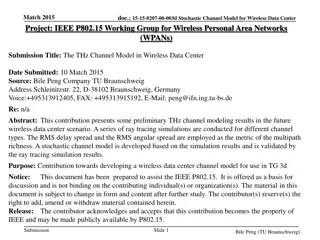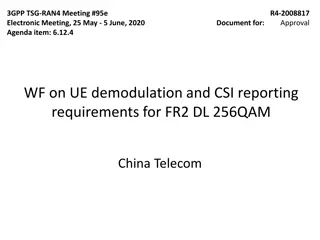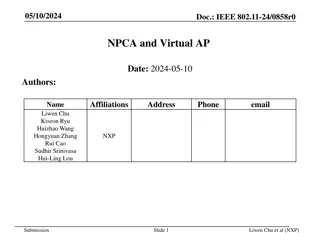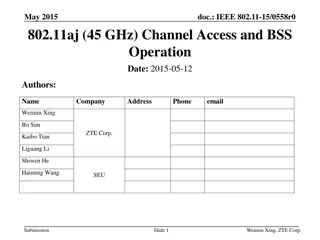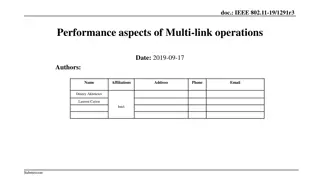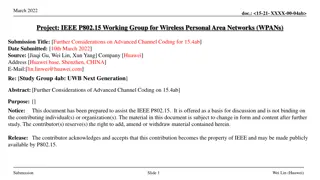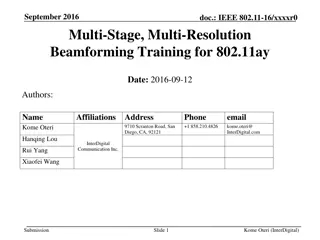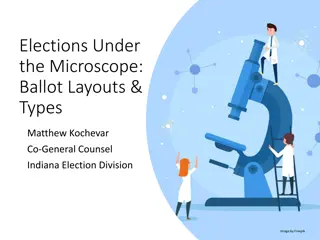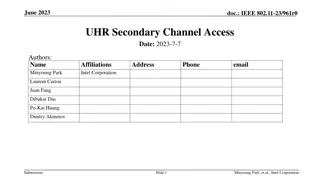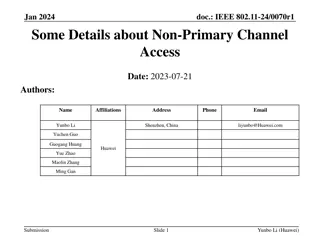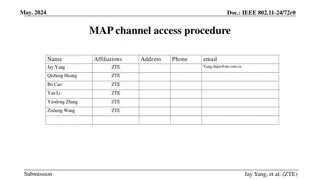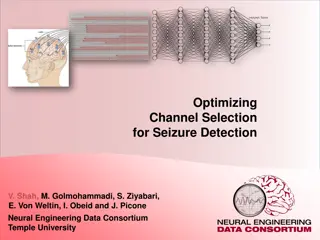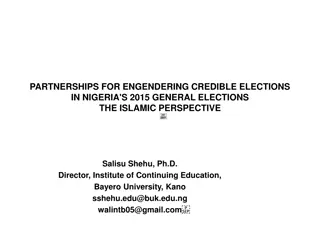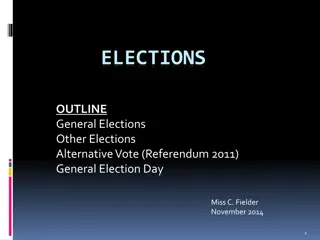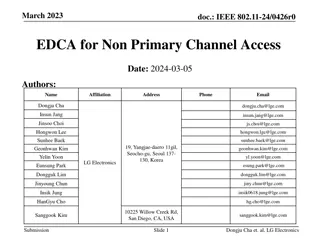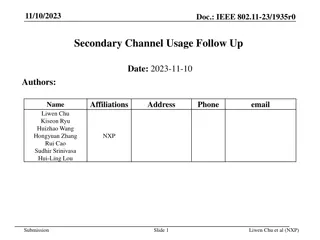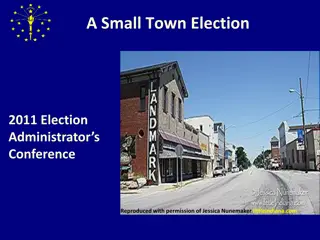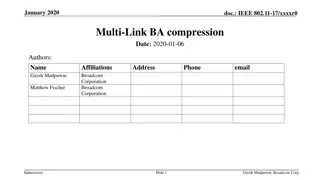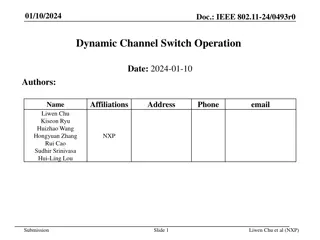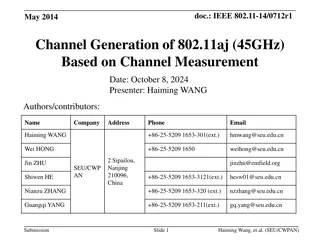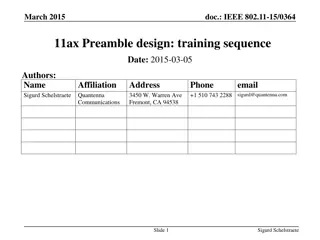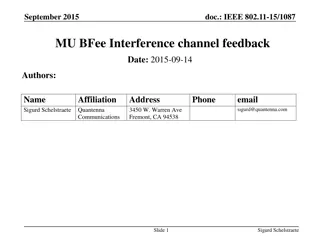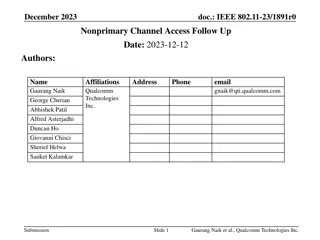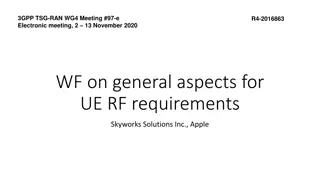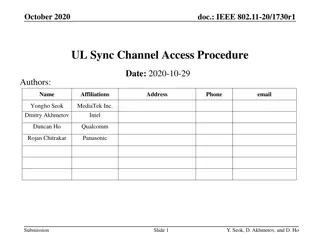Channel Design
Channel design involves creating a plan for the efficient distribution and movement of products and services from the producer to the customer. This process includes determining the channel flow, identifying channel members, setting channel objectives, and developing a channel strategy.
0 views • 13 slides
Sales Leadership Management
Marketing channel decisions play a crucial role in the success or failure of products in both B2C and B2B markets. This chapter explores the importance of effective channel management, types of channels, the role of intermediaries in streamlining transactions, and the distinction between marketing c
1 views • 18 slides
Channel Design in Marketing
Channel design involves planning the distribution of products and services from producers to customers through different business entities or individuals. It encompasses elements like channel flow, channel members, objectives, alternatives, and strategy. Successful channel design aligns with busines
0 views • 13 slides
Supreme Court Rejects Petitions Against EVM Use In Elections
Supreme Court Rejects Petitions Against EVM Use In Elections\\nNew Delhi: \\nThe Supreme Court on Friday dismissed two writ petitions: namely, apprehensions over 19 lakhs missing EVMs and another petition to use ballot paper to conduct elections while reposing its faith in the EVMs.\\nAdjudicating t
2 views • 4 slides
ML-Aided Channel Classification for WLAN Optimization
The paper discusses using machine learning to classify IEEE channel models and improve WLAN performance. It demonstrates how neural networks can accurately classify channel types, leading to efficient beamforming and signal processing. Simulation results show the classification performance even at l
1 views • 12 slides
Elections in West Virginia
Learn about types of elections, voting requirements, absentee voting, primary elections, general elections, and other types of elections in West Virginia. Discover how to participate in the electoral process and make your voice heard.
0 views • 9 slides
Unit Elections Team Training and Responsibilities
This resource covers the roles and responsibilities of a Unit Elections Committee in the Order of the Arrow organization. It includes details on coordinating all aspects of unit elections, training teams, scheduling elections, communicating with leaders, recording results, reviewing evaluation repor
2 views • 58 slides
IEEE 802.11-23/1980r1 Coordinated AP-assisted Medium Synchronization Recovery
This document from December 2023 discusses medium synchronization recovery leveraging multi-AP coordination for multi-link devices. It covers features such as Multi-link device (MLD), Multi-link operation (MLO), and Ultra High Reliability (UHR) capability defined in P802.11bn for improvements in rat
0 views • 8 slides
Successful Channel Modification Techniques and Benefits
Channel modification projects aim to accelerate the recovery of stable, sustainable channel forms in dynamic balance with sediment, large wood, and flow regimes. Successful modifications lead to improved habitat quality, stability, and diversity, benefiting sediment transport and riparian zones. Phy
0 views • 15 slides
Multi-Band Multi-Channel Concept in IEEE 802.11be
Exploring the benefits of Multi-Band Multi-Channel (MBMC) operation in IEEE 802.11be, this study delves into the efficient use of spectrum, increased data rates, and network load balancing. It also discusses the envisioned usage models and compares Single Band Operation with Multi-Band Operation, hi
3 views • 20 slides
Multi-Band, Multi-Channel Concept in IEEE 802.11be
Explore the advantages of Multi-Band, Multi-Channel (MBMC) operation in IEEE 802.11be, focusing on efficient spectrum use, increased data rates, and dynamic band switching. Learn about usage models and compare with single-band operations. Discover how MBMC enables concurrent operation across multipl
0 views • 22 slides
Effective Channel Management Decisions for Marketing Success
The success of marketing channels lies in making right channel design decisions and effectively implementing them through channel management decisions. From selecting channel members to training and motivating them, companies must focus on building strong partnerships to drive success in the competi
5 views • 6 slides
Adapting the 802.11be Channel Model for Modern Doppler Use-Cases
The document discusses the adaptation of the 802.11be channel model to modern scenarios where devices are mobile. It explores the impact of movement on channel models, providing lab measurement results of Doppler Power Spectral Density. The study aims to enhance the evaluation of communication schem
0 views • 16 slides
The THz Channel Model in Wireless Data Center
This contribution presents preliminary THz channel modeling results for future wireless data center scenarios. Ray tracing simulations are conducted for various channel types, utilizing RMS delay spread and RMS angular spread to measure multipath richness. A stochastic channel model is developed and
0 views • 33 slides
PDSCH Demodulation Parameters & Requirements Discussion
This document covers the discussion on PDSCH demodulation parameters and requirements for UE demodulation and CSI reporting in FR2 DL 256QAM, specifically focusing on static channel mode, TDL-D channel mode, and TDL-A channel mode. The document also explores rank options, channel bandwidth, PRB allo
0 views • 9 slides
IEEE 802.11-24/0858r0: Key Concepts on NPCA and Virtual APs
This document discusses key concepts related to NPCA (Neighbor-Primary Channel Announcement) and Virtual Access Points (APs) in the context of IEEE 802.11 standards. It covers topics such as multiple BSSID sets, co-hosted APs, NPCA primary channel configurations, and criteria for channel switching.
0 views • 9 slides
802.11aj 45 GHz Channel Access and BSS Operation Framework Proposal
This document outlines a proposal for channel operation and BSS operation in the 45 GHz frequency bands for 802.11aj in China. It includes details on channelization, spectrum allocation, maximum transmit power, and BSS configuration rules. The aim is to meet the functional requirements specified whi
0 views • 32 slides
Insights on Elections, Markets, and Your Portfolio: An Analyst's Playbook
Explore the historical impact of elections on portfolios, economic policies, and market uncertainties. Gain valuable insights on election cycles, market trends during election years, correlations between elections and recessions, and historical market performance based on different presidential term
1 views • 47 slides
Performance Aspects of Multi-link Operations in IEEE 802.11-19/1291r3
This document discusses the motivation, assumptions, and classifications related to multi-link operations in IEEE 802.11-19/1291r3 standard. It explores the benefits of multi-link capabilities in new wireless devices, such as improved throughput, reduced latency, and potential for link aggregation.
0 views • 18 slides
Further Considerations on Advanced Channel Coding for 15.4ab
This document submitted to the IEEE P802.15 Working Group discusses the importance of advanced channel coding for IEEE 802.15.4ab standard to achieve higher throughput and reliability. It outlines technical guidance on proposed solutions, safeguards, interference mitigation techniques, and backward
0 views • 14 slides
Multi-Stage, Multi-Resolution Beamforming Training for IEEE 802.11ay
In September 2016, a proposal was introduced to enhance the beamforming training procedures in IEEE 802.11ay for increased efficiency and MIMO support. The proposal suggests a multi-stage, multi-resolution beamforming training framework to improve efficiency in scenarios with high-resolution beams a
0 views • 11 slides
Ballot Layouts and Types for Elections in Indiana
Explore the various ballot layouts and types for elections in Indiana, including primary and general elections, with a focus on different variations such as D & R primary ballots, local public question-only ballots, and federal-only ballots. Learn how to prepare ballots for different scenarios and u
0 views • 9 slides
Proposal for Improved Channel Access Efficiency in IEEE 802.11 Networks
The proposal addresses the inefficiencies in utilizing secondary channels in IEEE 802.11 networks, aiming to enhance access to wideband channels (>20 MHz) when the primary channel is busy. It introduces a mechanism for APs and STAs to access available secondary channels while the primary channel is
1 views • 7 slides
IEEE 802.11-24/0070r1 Presentation on Non-Primary Channel Access
This presentation discusses the concept of using secondary channels for PPDU transmission in IEEE 802.11 networks to improve efficiency in large bandwidth scenarios. It covers topics such as channel access, backoff mechanisms, and channel switching thresholds. Design principles emphasize minimal imp
0 views • 15 slides
Proposed MAP Channel Access Procedures in IEEE 802.11-24/72r0
In the May 2024 document IEEE 802.11-24/72r0, a uniform MAP coordination framework is discussed, involving procedures like M-AP discovery, coordinated transmissions, and channel access mechanisms. All APs in a coordination group can compete for channel access and share transmission opportunities. Th
0 views • 10 slides
Optimizing Channel Selection for Seizure Detection with Deep Learning Algorithm
Investigating the impact of different channel configurations in detecting artifacts in scalp EEG records for seizure detection. A deep learning algorithm, CNN/LSTM, was employed on various channel setups to minimize loss of spatial information. Results show sensitivities between 33%-37% with false a
0 views • 12 slides
Partnerships for Engendering Credible Elections in Nigeria's 2015 General Elections: The Islamic Perspective
The quest for credible elections in Nigeria is crucial for forging responsible leadership and good governance. This article explores the Islamic perspective on forming partnerships to ensure free, fair, and credible elections, highlighting the importance of historical frameworks, interfaith collabor
1 views • 13 slides
UK Elections and Political Systems
Explore the intricacies of UK elections and its political systems, including the roles of Parliament, the House of Commons, and the House of Lords. Learn about the General Election process, First-Past-the-Post system, constituencies, and the various types of elections in the UK like the Scottish Par
0 views • 10 slides
Enhanced Distributed Channel Access (EDCA) for Non-Primary Channel in IEEE 802.11
Discussion on implementing EDCA for Non-Primary Channel Access (NPCA) in IEEE 802.11, focusing on mitigating frame collisions and enhancing medium efficiency. Various considerations for EDCA procedure on the Non-Primary Channel (NPCH) are explored to optimize channel access and reduce wastage. Topic
0 views • 13 slides
IEEE 802.11-23/1935r0 - Secondary Channel Usage Discussions
Explore the discussions on secondary channel usage in IEEE 802.11-23/1935r0, including topics like RU index, BW negotiation, avoiding medium synchronization loss, and single/multiple secondary backoff 20MHz channels. Discover insights on non-primary backoff 20MHz channel locations, transitioning del
0 views • 15 slides
Small Town Elections: Procedures and Responsibilities
Explore the intricacies of small town elections, from defining small towns to the roles and procedures involved. Discover who conducts the elections, how candidates are nominated, and the powers of the Town Election Board. Gain insights into the differences between county and town election boards in
1 views • 29 slides
IEEE 802.11-17: Enhancing Multi-Link Operation for Higher Throughput
The document discusses IEEE 802.11-17/xxxxr0 focusing on multi-link operation for achieving higher throughput. It covers motions adopted in the SFD related to asynchronous multi-link channel access, mechanisms for multi-link operation, and shared sequence number space. Additionally, it explores the
0 views • 14 slides
The Electoral Process in the United States
Elections in the U.S. consist of primary and general elections at federal, state, and local levels. Primary elections select candidates within political parties, while general elections determine officeholders such as the President and Congress members. The Electoral College plays a crucial role in
1 views • 15 slides
Dynamic Channel Switch Operation in IEEE 802.11-24 Standard
STAs in IEEE 802.11-24 can dynamically switch to secondary channels per the AP's request for frame exchanges. The process involves soliciting control frames, determining parking channels, managing frame exchanges, and switching back to the primary channel at the end of a TXOP. Various examples illus
1 views • 11 slides
Channel Generation Process for IEEE 802.11aj (45GHz) Based on Channel Measurement
This presentation by Haiming Wang and team from SEU/CWPAN discusses the process of channel realization and generation in the 45 GHz bandwidth. It covers the generation of the channel impulse response, modeling of parameters, statistical measurements, and future work related to the 802.11ad standard.
0 views • 27 slides
IEEE 802.11-15/0364: Channel Estimation Considerations in Wi-Fi Standards
Channel estimation in IEEE 802.11 standards, such as 11n, 11ac, and 11ax, is crucial for efficient MIMO systems. The noise impact during data reception affects the quality of the channel estimate, leading to SNR reduction post-equalizer. Techniques like channel smoothing and averaging of training se
0 views • 11 slides
Managing Channel Information for Wireless Communication Systems
This document from September 2015 discusses issues related to updating channel information in wireless communication systems, focusing on MU-MIMO and TxBF precoding techniques. It explains the challenges of channel aging, the importance of refreshing channel information, and the impact of different
0 views • 16 slides
Enhancing Spectral Efficiency Through Nonprimary Channel Access in IEEE 802.11
IEEE 802.11 is exploring nonprimary channel access to address underutilization of spectrum and improve latency and throughput. This approach involves enabling nonprimary channel access with simple modifications to existing rules, such as limiting TXOP duration and using control frames for coordinati
0 views • 13 slides
Overview of UE RF Requirements for 35/45MHz Channel Bandwidth in 3GPP Meeting #97-e
The document discusses the introduction of 35/45MHz channel bandwidth in UE RF requirements for various bands. It covers equation-based requirements and limitations in UL configurations based on bandwidth allocation. The scope includes capturing content from the first round discussions and clarifyin
0 views • 16 slides
UL Sync Channel Access Procedure in IEEE 802.11-20/1730r1
The document discusses the UL sync channel access procedure in IEEE 802.11, focusing on the conditions under which an STA affiliated with an MLD can initiate transmission, manage its backoff counter, and follow specific rules for accessing the channel. It proposes a straw poll to gather support for
0 views • 8 slides




